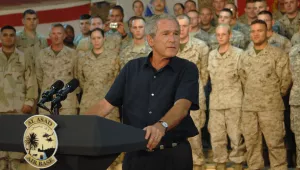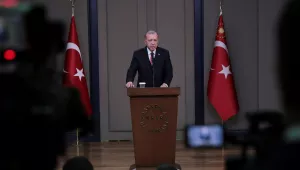Abstract
What are the roots and aims of Iran's foreign policy in post-invasion Iraq? Many scholars attribute Iran's policies to a desire to achieve national and regional interests, perceiving this policy to be mainly offensive and ideological. I argue instead that the roots and aims of Iran's foreign policy are defensive, mainly pragmatic, and based on state-oriented and strategic issues. As to Iran-U.S. relations in the new Iraq, the main controversy involves different perceptions of the security challenges; actions that Washington considers to be necessary for protecting the U.S. interests in post-invasion Iraq are regarded by Tehran as undermining Iran's security and national interests. The new political-security developments in post-invasion Iraq have led Iran to seek a friendly, stable, secure and prosperous neighbor. However, the Bush administration's regional policy — largely focused on defining Iraq as a counterweight to Iran, building regional alliances against Iran, and establishing long-term military bases next to Iran's borders — has compelled Iran to oppose it.
I argue that historical views and stateoriented and strategic issues all have significant effects on Iran's foreign policy in post-invasion Iraq. I then explain that the nature of cultural and political-security characteristics of Iran's sources of power as well as the demands of the factors and principles involved in Iran-Iraq relations will inevitably force Iran to be pragmatic in its policy toward the new Iraq; ideology is only one source of Iran's power. Lastly, I argue that Iran's foreign policy is based on achieving strategic aims. It is the result of a combination of considerations aimed at producing both security and opportunities. The birth of a new Iraq demands a revision of the current regional political-security architecture, mainly based on "balance of power." By shifting Iraq to a friendly state, Iran desires to discard the traditional designation of Iraq as Iran's counterbalance in the Persian Gulf and to turn the new relations into a "balance of interests." The main conflict in Iranian-U.S. relations in post-invasion Iraq is based on redefining Iraq's political-security structure. Understanding the roots of Iran's foreign policy has important implications for the United States and regional countries that are currently concerned about Iran's role and aims in Iraq.
VIEWS AND CONSTANTS
The Iranian View of Iraq
A major part of Iranian foreign policy toward the new Iraq is influenced by a troubled history of competition and disproportionate Sunni dominance over Iraq's natural resources, potential economic strength and key geographical position. The prevalent Iranian view is consequently one based on mistrust, to such an extent that even the removal of Saddam Hussein has not altered it. This concern was manifested in the Islamic Republic's two-pillar policy in the early days of the 2003 Iraqi crisis. On one hand, Iran opposed the American invasion and subsequent occupation. On the other, it designated Saddam's regime as a brutal one that deserved to be overthrown and punished. Iran did not want to see a pro-American Iraqi client regime with like-minded elites that would probably act in favor of U.S. purposes and in defiance of the Islamic Republic.
A nationalist view inside Iran holds that Iranian interests are distinct from those of the Arab world, whether they are cultural, economic, political or even military. This view holds that relations between Persians and Arabs have roots in their history. Even today, some Iranians believe that in a possible Iran-U.S. conflict, Arab regimes will act contrary to Iran's national interests. There is, therefore, an essential irreconcilable hostility between the two sides, and Iraq is not an exception. Saddam's aggression against Iran emerged from this cultural pattern. This way of thinking exists among Iranian nationalists, political elites, intellectuals, the Iranian Diaspora and manyordinary citizens. Another view maintains that in order to preserve Iran's pragmatic goals in the region, there should be only a reasonable level of political and security collaboration between the two sides. Some experts tend to agree that acting in favor of Arab issues, such as the Israeli-Palestinian conflict, has not only been costly to Iran's national interests, but has also resulted in little gratitude from the Arab world. Consequently, Iran should prioritize national interests as a precondition for conducting its regional and international relations. This view has theoretical bases within Iran and exists among some Iranian political elites and particularly academics and intellectuals.
There are also pan-Islamic and pragmatic views inside Iran for dealing with the Arab world. Focused on Islamic identity, one view holds that Iran should define its national interests in terms of coordination with Arab countries as an important player within the Islamic world. This standpoint maintains that the Islamic Republic needs to be directly and actively involved in all issues related to the Islamic world. Furthermore, such a view contends that the interests of the Islamic Republic demand the establishment of an enduring link with the Arab Middle East. During the first Persian Gulf War in 1990, some supporters of this way of thinking held the belief that Islamic duty required Iran to act against the United States and in favor of the Iraqi people, especially the Southern Shia. Another pragmatic view maintains that the enduring reality of the Arab world requires Iran to establish cooperation with its major representatives. Supporters of this view refer both to the demands of the constitution and to issues of geographical, cultural and religious coherence. Since the early 1990s, Iranian foreign policy has been based on confidence building and détente in the region, as practiced by the contemporary establishment, which believes in close relations with the Arab world, especially the new Iraq, given the two sides' cultural and religious similarities.
Whatever approach one favors, Iraq, because of its sources of power and politics, remains a significant factor in determining Iran's national-security interests. Though Iraq is an Arab country, its recent issues and problems have influenced Iran's (and Turkey's) national security....
Barzegar, Kayhan. “Iran's Foreign Policy in Post-invasion Iraq.” Middle East Policy, Winter 2008





